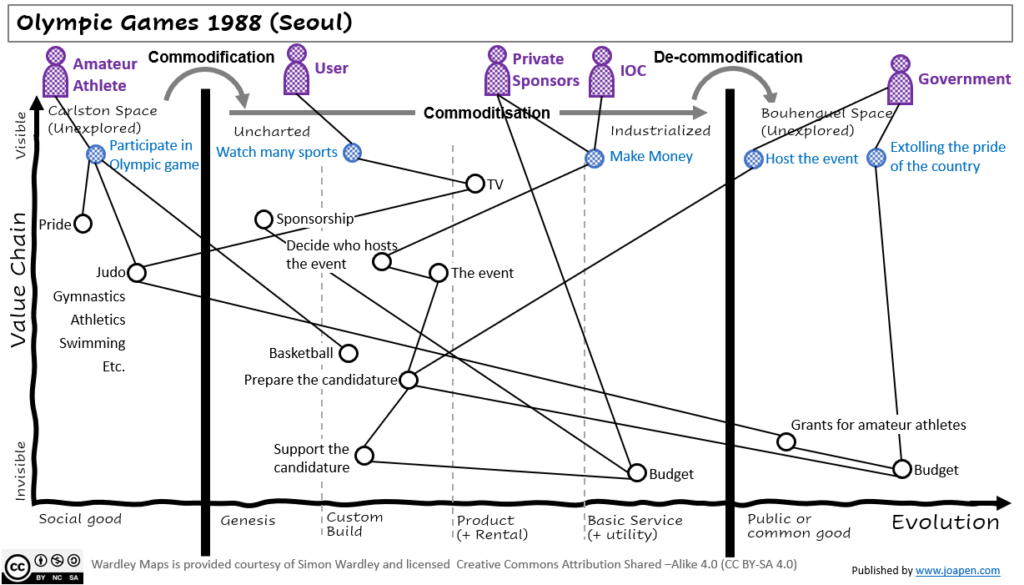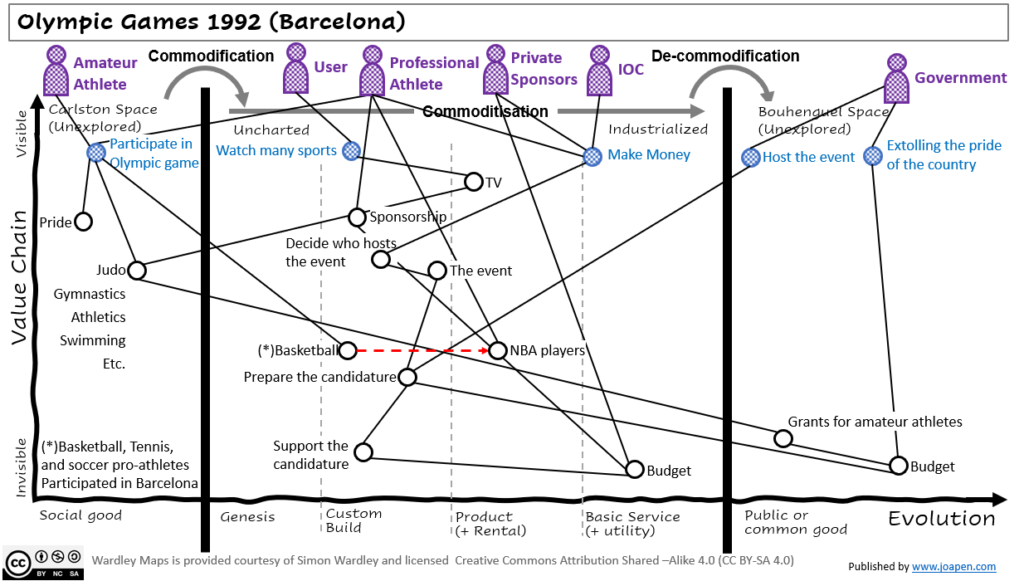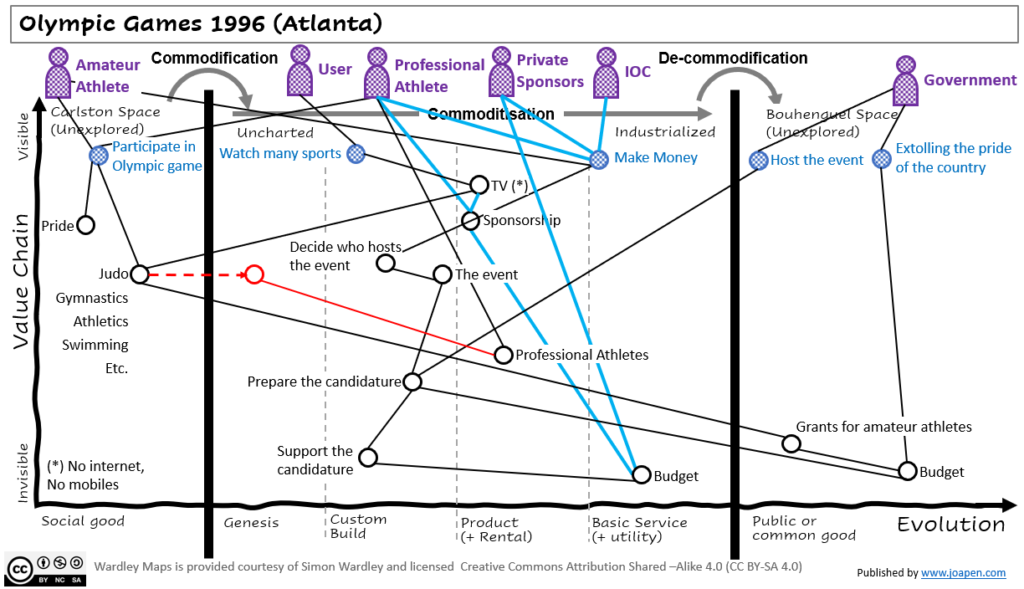Background
This is a series of Wardley Maps trying to explore outside the competitive landscape.
Using the Olympic Game as example. Starting in 1988 (it’s what I remember).
Purpose: Show my view about how a country pride event turned into a commercial event.
I don’t like to do maps alone, so feedback is welcomed.
Seoul Olympic Games (1988)
Context in 1988:
- Athletes are amateur athletes. The participation into the event is a major milestone for them.
- There are athletes that their main job is to play a sport (for instance basketball in Europe). But they are considered amateur. NBA players, soccer professional players are not allowed to participate in Olympic Games.
- The COI organizes events to decide who is the next city organizing the Olympic Games.
- Government of the countries are a the main interested in the Olympic Games as they represent the pride of the country. There’s not a global event such Olympic Games and it’s the event where the number of medals by country (not by athlete) represents the podium of the winner.
- Governments are the main sponsors of the Olympic Games by far.
- In a world where countries and governments are defending a lifestyle within their citizens and with a differentiation between western and eastern countries.
- First Olympic Games where URSS and US participate (after Mosco 1980 and Los Angeles 1984).

During these Olympic Games some relevant events happened.
- URSS won the Gold Medal in Basketball, a game created in US.
- The next Olympics Games are organized in Barcelona (1992).
- The 1996 games are still to be decided. US have major interest on them. Everything needs to make sense: organize the games in 1996 and ensure US is the country with more Gold medals and total amount of medals.
- A basketball defeat against URSS in US is not something acceptable.
Barcelona Olympic Games (1992)
Context in 1992:
- Berlin wall falled in 1989.
- URSS did not participate as country in the Olympic Games. It was the moment where the countries where in tension till they formally separated.
- The modern Olympic Games started in 1896 and Athens presented its candidature to 1996. Athens was the “natural choice”, but something very different happened.
- 1984 were a success as TV audience and the advertisement revenue was significantly high. TV audience was worldwide, something new.
- The view was that celebrating the Olympics Games in US in 1996 will enable a huge amount of money to all relevant stakeholders. US government had a different view about sponsorship an event that in their view was a commercial event. US government knew that IOC and the private sponsors could make money with the event and they rejected to sponsorship an event that was in their view a commercial event.
- The election of a city is done in 5 rounds of votes. Athens won the first 3 rounds. Atlanta won the last 2 rounds. The final round was the one that decided Atlanta. We are in 1990.
- The Atlanta Olympic Games were founded entirely by private founding (first time this happened). The US government just budgeted the security. This is very relevant and changed the whole thing.
- Private budget = $1.7 billion,
- Public budget = $500m (security).
- There were another point to be solved in 1990: US cannot be defeated by the URSS in basketball. By chance, IOC agreed to admit professional athletes into the event.
- FIFA did not agreed at all with this decision: the organizes the soccer World Cup. FIFA agreed that only 3 professional players by country could attend the Olympic Games.
- NBA vision was different: this is a great step to advertise the NBA outside of the US.
- Nike is a US firm that want to be global, the are pioneers in many aspects, and they get Michael Jordan (MJ is already a Nike Sport), as the main asset to advertise Nike.

During these Olympic Games some relevant events happened:
- NBA players went to Barcelona with high expectance about what they can do.
- The US basketball team was sponsored by Adidas.
- Michael Jordan was sponsored by Nike.
- Nike uses Michael Jordan and exploits his presence as Nike does.
- There’s the anecdote around this, and it’s when US Basketball team went to get the gold medal with the Adidas uniform. Michael Jordan appeared with an US flag on his shoulders so he could cover himself (and the Adidas logo) in an elegant way.
- Professional tennis players participated too in the event, with some sponsorship from their brands.
- Barcelona was a testing lab about how to make money advertising through the Athletes: the protagonists in front of the TV.
Atlanta Olympic Games (1996)
Context in 1996:
- These are the first private Olympic Games.
- This makes the sponsorships to see the government as the main player, and it’s IOC the main player.
- The sponsors understand the impact and rising growth of TV for sport events, the learnings done in 1992 specially on the basketball event is the proof they were looking for. Having US as the major market of TV of the world, Atlanta is the perfect place for an Olympic Games event.
- Other sports understand the move and many amateur athletes understand there is a opportunity to jump into a professional stage or at least to get sponsorship.
- The participation in the Olympic Games was not only a question of pride, it was a question of presence in front of the TV cameras and the ability to close deals with sport retail companies (the main interested ones).
- Coca Cola Headquarters is in Atlanta, and the company sponsored many events, buildings and other initiatives.
- The map below represents in blue the main capital flows in Atlanta. Government is almost out of the influence, and the private sponsors are the ones leading the game.
- On the left side of the map, Atlanta was the starting point of many amateur athletes to jump into the commercial scene. Private sponsors added to the public grants enabled many of them to have some income.
- The raise of TV had many impact on all this. Remember, in 1996 internet was not on our personal computers and we had not mobiles.

During these Olympic Games some relevant events happened:
- Andre Agassi (US and Nike) won the gold medal in tennis.
- Michael Johnson (US and Nike) won the gold medal in 400m and 200m.
- Nike aggressively sent many employees to the event, giving the attendants Nike flags, adding billboards with aggressive messages, and having direct conflicts with IOC representatives.
- These games were a profitable event. This fact enables the IOC to sell the event at different scale.
The consequences of Atlanta and the raise of TV as lever to maximize the event exposure had many negative consequences in the future:
- Sydney 2000 was a major event, this time organized with public and private capital. It was much expensive than the 1996 Atlanta event.
- Athens organized the 2004 (it was awarded in 1997). The level of debt Greece put in the games organization was massive and they did not recover the expected revenue.
- The Olympic Games in 2008 celebrated in Beijing were more expensive too. The Chinese government almost won the 2000 Olympic games, but the Human Rights causes and other lobbies ended with the games in Sydney. China wanted a games with China in the first place of the podium, and they put all necessary efforts to make it happen. IOC ignored many complaints about doping that other countries did.
Closing
Olympic games is a great case to study the outside market place.
To me, Atlanta 1996 was the event that turned a country pride event turned into a commercial event. Here we have to recognized the vision of the US government that had clear this situation and has clear the intentions of the IOC (make money).
Despite we had cases as Beijing, where the majority of the capital came from the government, the other events have been funded mainly by private capital in cooperation with the governments: All decisions about the Olympic games are done in the competitive market space: athletes, cities organizing the event, sponsors, IOC… all are playing there. The governments are the only players out of that market place but they fall into the influence of the grandiosity of an event like this.
There is something that has not changed: the aim of the IOC to make more money.
Personally I don’t watch Olympic Games since 1996, this was the last time I enjoyed them. I did not watch the 2000 Olympic games and I don’t miss them.
As usual, any feedback is welcome.